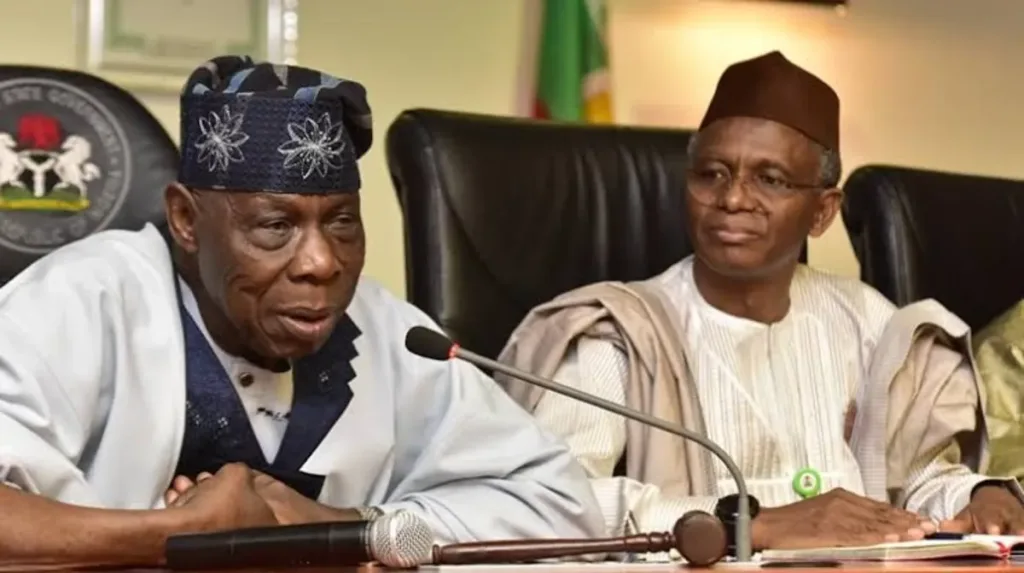Former President Olusegun Obasanjo, on Friday, revealed how he rejected a move to have him endorse former Kaduna State Governor, Malam Nasir El-Rufai, as his successor.
Under the Obasanjo government, El-Rufai served first as the Director-General of the Bureau of Public Enterprises (BPE) and later as the Minister of the Federal Capital Territory (FCT) from 2003 to 2007.
While exiting power in 2007, Obasanjo backed the late President Umaru Musa Yar’Adua as his successor.
Speaking in Abeokuta, Ogun State, at the second edition of the annual symposium of the Ajibosin Platform with the theme “Importance of Leadership in Governance,” Obasanjo revealed that former Minister of Aviation, Osita Chidoka, had recommended El-Rufai as his successor, but he brushed it aside.
Chidoka, who was the keynote speaker at the event, recalled how El-Rufai recommended him to Obasanjo at the age of 34, a move that brought him closer to the presidency and eventually led to his appointment as the Corps Marshal of the Federal Road Safety Corps (FRSC).
Addressing the gathering, Obasanjo threw a jab at Chidoka for his failure to tell the El-Rufai story.
“Let him tell you. He didn’t mention that. He was pushing when I was leaving government that his friend, El-Rufai, should be brought in as my successor,” Obasanjo said.
Facing Chidoka, who sat among the panelists, Obasanjo asked, “No be so (Is that not true)?”
The former minister nodded his head in agreement.
Obasanjo explained that he brushed aside the recommendation of El-Rufai as his successor because he felt his former minister needed to mature.
“I did not yield to the pressure. Later, he said, ‘I suggested this person, why didn’t you agree?’ I said El-Rufai needs to mature. You remember?
“When I left government and, many years later, he saw the performances of El-Rufai, he came back to me and said, ‘You’re absolutely correct. El-Rufai needed to mature.’”
Obasanjo, however, applauded Chidoka, El-Rufai, and others for their “special attributes,” which he said were the driving forces of his government.
Speaking on the theme, the Ota-farmer emphasized character, exposure, experience, and training as the hallmarks of good leadership.
Obasanjo said, “It’s only in politics that I found out there is no training for leadership. Even among armed robbers, I was told there is apprenticeship.
“But it’s only in politics that there is no training in leadership. That’s not good enough.”
Delivering the keynote address, Chidoka blamed Nigeria’s challenges on what he called excuses and the politics of alibi.
“Leadership finds its true measure not in speeches or charisma but in the systems it leaves behind.
“Moral conviction must translate into the everyday machinery of governance—rules, routines, and institutions that make competence predictable and corruption difficult.
“Nigeria’s problem has never been a shortage of ideas; it is the absence of systems strong enough to outlive their authors,” he said.
He called for a shift from excuses to action and taking responsibility.
“We must therefore make leadership accountable not to rhetoric but to results: measure by building national dashboards and accountability systems that track every promise, every budget, every outcome. Monitor by strengthening the institutions that evaluate government performance and expose complacency,” he said.
The convener of the symposium, Aare Olanrewaju Bakinson, said the lecture aimed to discuss the critical role effective leadership plays in shaping societies and nations.
“Leadership is not just about power; it’s about responsibility, vision, and service. As we explore this theme, we’ll examine the qualities of good governance, the impact of leadership on development, and strategies for fostering ethical leadership,” he said.
Among the prominent personalities at the event were Senator representing Ogun Central, Shuaibu Salis; the Olowu of Owu Kingdom, Oba Saka Matemilola; the Olota of Ota, Oba Adeyemi Obalanlege; and former Ogun First Lady, Mrs. Olufunsho Amosun.
